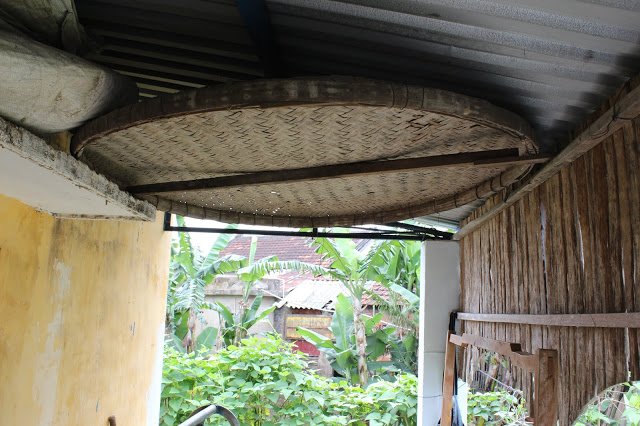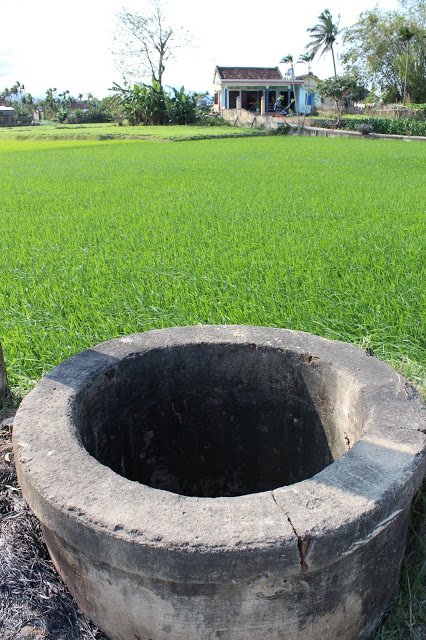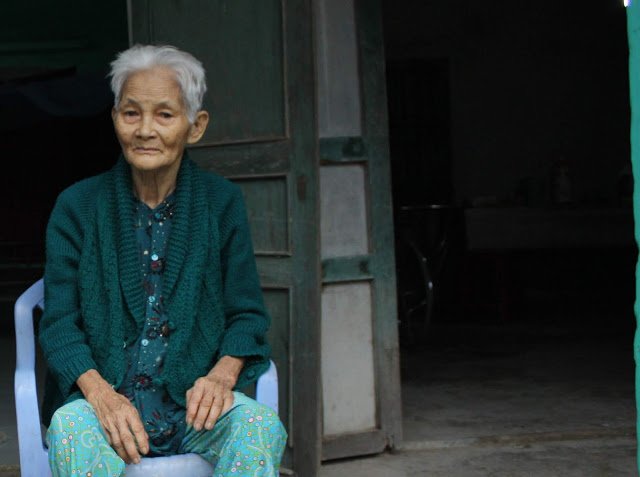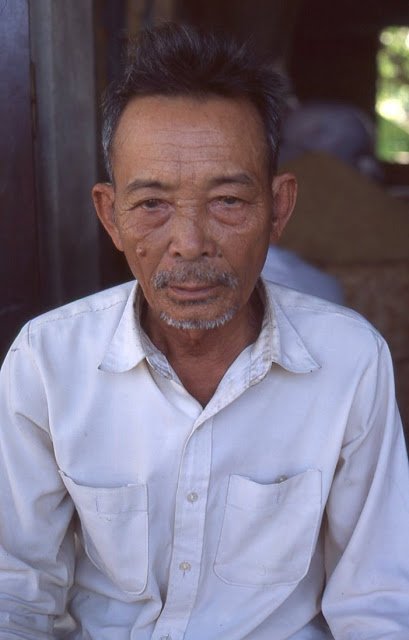Precursor to the Mỹ Lai Massacre: 1968 Phong Nhị, Phong Nhất_11
South Vietnamese militia man, Nguyễn Xá, who on February 12, 1968, witnessed the massacre via his binoculars, from his base next to the number one national highway, near Phong Nhị. Nguyễn Xá lost all motivation to fight in the war after witnessing allied troops inciting the massacre.
Chapter 11 : The Sorrows of Nguyễn Xá, South Vietnamese militiaman
It was a vivid close-up.
A Korean marine looking angry and holding his gun against the backdrop of red flames. One could make out countless corpses of the elderly, women and children. There were also those who were injured and desperately pleading for mercy. South Vietnamese militiaman, Nguyễn Xá (30), put down his binoculars, no longer able to keep his eyes on this gruesome scene that was enlarged by 5 to 6 times. He was at a distance where he could see clearly with the naked eye anyway. In the midst of the continued sounds of gunshots and bombs, he handed his binoculars to his colleague and came down from the guardpost. They were at the guardpost next to the number one national highway, near the village of Phong Nhị. Nguyễn Xá, along with 26 other militiamen, reconnoitered the neighboring areas, using this post as their base, and were urgently deployed whenever there was an incident. And that was one of such days. Every member of the militia assembled at the base. An officer of the United Nations Operation Command and five soldiers were also present. They all gazed westward in the direction of Phong Nhị, which was burning up in flames. It was around 1:30 pm on February 12, 1968.
Nguyễn Xá felt overcome with helplessness. There was absolutely nothing he could do. It was around 10:00 am that he saw from a bunker in the base, Korean soldiers migrating towards Phong Nhị. Never in his wildest dreams did he imagine that they would infiltrate the villages and attack the civilians. Many family members and relatives of the South Vietnamese militiamen resided in the villages. Naturally, they all contended that they need to rush to the villages to stop the Korean soldiers and rescue the villagers. The U.S. officer, however, told them to stay put and wait, as it was dangerous. The Korean soldiers were emotionally charged, which could potentially lead to armed conflict.
Some people from neighboring villages gathered in a commotion near the base as well. The South Vietnamese militiamen became more agitated. Nguyễn Xá’s home was located in Phong Nhị, but closer to the base that it was a bit distanced from the scene of the massacre. He hoped his wife, Lê Thị, daughter, Nguyễn Thị Liên(6), and son, Nguyễn Đức Phước(2), were safe. But the problem was the wife of his older brother (who went missing after being taken away by the Viet Cong a year ago) and their four children. Their maternal aunt lived with them as well. Given that the Korean soldiers slaughtered everything in sight, it was hardly conceivable that they would be safe. Nguyễn Xá felt extremely antsy.
Nguyễn Thị Lượng(31) was inside the bomb shelter of her home at the time. As soon as she heard gunshots, she hid along with her mother, Nguyễn Thị Lực(52). There were no men in the household. Her father, Nguyễn Thừa, had passed away, and Nguyễn Thị Lượng wasn’t married yet. She did, however, have a finance named Hà Ngọc Mẹo, who was a South Vietnamese soldier. He was far away, fighting in the jungles against the Viet Cong. The two women stayed motionless for an hour inside the shelter. Their home was less than a kilometer away from the base, but fortunately, located on the opposite end of Phong Nhị. She thought of all of her relatives that lived in Phong Nhị, wondering if they were safe, but all she could do was wait until the chaos dies down.
Nguyễn Thị Nghĩa(30) was not inside a bomb shelter. She remained hidden in her home in Phong Nhất, holding her four children close, while looking over at the village of Phong Nhị. The sound of gunshots made her heart beat rapidly. She motioned to her daughters, Trần Thị Bình(9) and Trần Thị Bông(7), and her sons, Trần Văn Thông(3) and Trần Văn Minh(1) to shut their eyes and cover their ears.

February 2014, The wicker tray at the home of Nguyễn Thị Nghĩa. The tray is used for drying foods, but on February 12, 1968, it was used to transport or dispose of corpses. Photograph taken in February 2014.
Nguyễn Thị Nghĩa did not have binoculars, but she saw everything all too clearly. She couldn’t believe the shocking and barbaric sight that lay before her very own eyes. Korean soldiers stacked corpses on a round wicker tray used for food and threw them all at once onto the fields. There was a similar wicker tray hanging in her backhouse as well. The corpses on the tray appeared to be a mother and four children. They treated human beings as if they were wild animals. The Korean troops even threw the dead bodies into wells. These wells provided water for crops. She began wondering if her older sister, Nguyễn Thị Thời(33), was also in one of those wells. Her sister lived in Phong Nhị. That’s where Nguyễn Thị Nghĩa was born as well. She began worrying about her sister’s two children as well. But again, all she could do was wait for the gunshots to subside.
Around 3:00 pm, Nguyễn Xá left his base. U.S. troops, figuring that the Korean troops had already left the village, headed over to Phong Nhị with the South Vietnamese militia. Nguyễn Thị Lượng, who had been hiding in her bomb shelter, and Nguyễn Thị Nghĩa, who was surreptitiously observing the scene from afar, also made their way over to Phong Nhị. All they could think about was finding out whether their families and relatives made it through alive.
It felt as if a big stone that was stuck inside their chests sunk down to their stomachs. Nguyễn Xá found his niece and nephew, heavily injured at the entrance of the village. Nguyễn Đức Sang, who was bleeding from his stomach and buttocks, could not even get up. His nephew was being propped up by Nguyễn Thị Thời, a fellow villager. Đức Sang told him that he had crawled there from home. Nguyễn Đức Sang’s younger sister, Thị Thanh’s innards were spilling out, and her stomach was bleeding heavily. They urgently needed medical care. Just when both were about to lose consciousness, a U.S. rescue helicopter landed on the number one national highway. They would be able to go to a hospital in Da Nang within ten minutes.

The villagers attested to witnessing Korean troops throw corpses into wells throughout the villages of Phong Nhị and Phong Nhất that day. The wells provided water for crops in Phong Nhị. Photograph taken in February 2014.
Nguyễn Xá helped his niece and nephew onto the helicopter as well. There was another unidentified woman on the helicopter. The U.S. pilot asked who would aboard as the guardian of the children. Nguyễn Xá was troubled, as he had to go find his sister-in-law and her remaining children. That’s when he caught sight of Nguyễn Thị Lượng, a distant relative of his and woman who had been hiding in her bomb shelter before making her way out to Phong Nhị. Nguyễn Xá grabbed her hands and pleaded, saying, “My nephew and niece are severely injured. They need to be transported by helicopter. Could you please go as their guardian?” Nguyễn Thị Lượng was in a bit of a daze. Nguyễn Xá added, “If they don’t make it to the hospital, please guard their corpses for me. I will meet you at the hospital as soon as possible.”
Nguyễn Thị Lượng reticently agreed as she couldn’t refuse, and got on a helicopter for the first time in her life. Nguyễn Đức Sang and Nguyen Thị Thanh were breathing heavily. There was blood all over the place. They didn’t appear as if they would be able to make it. What made her even more nervous than the children was the huge U.S. pilot sitting next to her in his uniform and sunglasses. She could see a gun by his side. She suddenly felt a rush of fear, remembering hearing how they had killed many people. Before she boarded the helicopter, Nguyễn Xá reassured her, saying, “It’s okay. Don’t look at the U.S. pilot; keep your gaze fixed on the children.” Accordingly, Nguyễn Thị Lượng dared not look at the face of the pilot.
The helicopter reached Da Nang in about ten minutes. As soon as the door of the helicopter opened, 3-4 doctors and nurses came over to carry the patients in. Nguyễn Thị Lượng followed them, but she was not allowed to enter the operating room, so she waited in the corridor of the hospital. Doctors constantly went in and out of the room. She worried about the sharp tools being used for the surgery, wondering whether it could potentially hurt them more. Two whole days had passed, but her niece and nephew were slow to come out of the operating room.
Nguyễn Xá entered Phong Nhị, only to find that there wasn’t a single relative who was safe and sound. His sister-in-law, Phan Thị Trí, was found as a corpse. His other niece and nephew, Nguyễn Thị Trọng and Nguyễn Đức Trường, their aunt, Phan Thị Ngư, and her son, Đoàn Thế Minh, were all found dead. Nguyễn Xá had to take care of their corpses. He then had to find out what happened to his niece and nephew at the hospital in Da Nang.
Nguyễn Thị Nghĩa cried as well. She found among the piles of corpses in Phong Nhị, that of her sister, Nguyễn Thị Thời. Her nephew, Lê Đình Đích(4), lay next to his mother as well, their lifeless bodies tangled. A peculiar sight was a newborn infant squirming next to his dead mother, whose breasts were exposed. She must have been breastfeeding her baby when she fell dead. Nguyễn Thị Nghĩa bemoaned her husband, Trần Ế(30).’s absence, as there was nobody who could console her. Her husband was a communist activist. She had no idea about his whereabouts, but he would sometimes stop by for short periods of time.
Nguyễn Xá felt overcome with self-loathing. He couldn’t bear to face the survivors and families of the victims. How was he supposed to explain this incident to these innocent people? If it had been committed by the Viet Cong, he would at least be able to lash out in rage, but such wasn’t the case. The ROK troops were allies of the South Vietnamese Army. The families of victims laid out the corpses on the road facing the militia base. They criticized the South Vietnamese government and Korean troops all night long. The Viet Cong were bound to employ this incident as a golden opportunity for political propaganda. Phong Nhị consisted of both supporters of the Viet Cong and supporters of the South Vietnamese government. In fact, Nguyễn Xá’s brother (the father of Nguyen Thị Thanh) was taken by the Viet Cong, while Nguyễn Thị Lượng’s fiance was in the South Vietnamese army, and Nguyễn Thị Nghĩa’s husband was a Viet Cong. Everybody in the village knew where each person stood, politically, but made no mention of it. Nguyễn Xá, who was on the side of the South Vietnamese Army as a militiaman, lost all urge to fight.

Nguyễn Thị Thời who first discovered Nguyễn Đức Sang, crawling with a severe injury. Đức Sang was eventually transported to the hospital by Nguyễn Thị Lượng, as requested by his uncle, Nguyễn Xá. Photograph taken in January 2013.
“Afraid to accept the cookies”
Nguyễn Thị Lượng Nguyễn Thị Nghĩa
Nguyễn Thị Lượng returned home to Phong Nhị two days after she had gone to the hospital in Da Nang on a helicopter. Nguyễn Xá eventually came as promised to take care of his niece and nephew, relieving her of her duties. Nguyễn Thị Lượng was surprised to find out a few months later that both children made it out alive. To her, it was a plain miracle.
Nguyễn Xá, who always felt responsible for taking care of the children in his dead brother’s place, was severely hurt from stepping in a landmine set by the Viet Cong, while reconnoitering near Phong Nhị. His right ankle was severed, along with three fingers on his left hand. He was treated for a year, but eventually had to get a prosthetic leg and also quit his position in the militia in 1970. In 1975, when Saigon fell to North Vietnam, he was imprisoned for 9 months and retrained on political ideology. The incident of February 12, 1968 forever remained a pain point and trauma for him. He constantly felt guilt toward his sister-in-law and her children. He passed away in 2006 from sickness, at the age of 68.
Nguyễn Thị Nghĩa, her eyes welling up in tears mid-testimony. Photograph taken in February 2014.
Nguyễn Thị Lượng, who, on the day of the incident, took Nguyễn Đức Sang and Nguyễn Thị Thanh to the hospital in Da Nang on a U.S. helicopter. Photograph taken in February 2014.
The fates of Nguyễn Thị Lượng and Nguyễn Thị Nghĩa, who had never known each other were interestingly intertwined. Three years later in 1971, Nguyễn Thị Lượng got married to Nguyễn Thị Nghĩa’s brother, Lê Đình Đái(1934~). Nguyễn Thị Lượng’s fiance, Hà Ngọc Mẹo, who was in the South Vietnamese army, died in battle against the Viet Cong, and Nguyễn Thị Thời, Lê Đình Đái’s former wife and older sister of Nguyễn Thị Nghĩa, was killed by a Korean soldier on February 12, 1968. It was Lê Đình Đái’s second marriage. Nguyễn Thị Lượng still annually commemorates the death of her husband’s former wife, Nguyễn Thị Thời and their son, Lê Đình Đích, who lost their lives in the massacre.
Several months after the incident, Nguyễn Thị Nghĩa encounters two lines of marching Korean troops. She stood there for a while, staring at the sight with her children. One of the soldiers came over to her and tried to start up a conversation. He took out a photograph of his family and showed it to her. He gently caressed the children’s hairs and offered them cookies. She couldn’t say a word back to him. She couldn’t even smile. Goosebumps ran up her arms, as all she could recall were the events of the day, February 12,1968.
- Written by humank (Journalist; Seoul, Korea)
- Translated and revised as necessary by April Kim (Tokyo, Japan)
The numbers in parentheses indicate the respective ages of the people at the time in 1968.
This series will be uploaded on Steemit biweekly on Monday.

Congratulations @humank! You have completed the following achievement on the Steem blockchain and have been rewarded with new badge(s) :
Click here to view your Board
If you no longer want to receive notifications, reply to this comment with the word
STOPTo support your work, I also upvoted your post!
Do not miss the last post from @steemitboard:
Thank you so much for sharing this amazing post with us!
Have you heard about Partiko? It’s a really convenient mobile app for Steem! With Partiko, you can easily see what’s going on in the Steem community, make posts and comments (no beneficiary cut forever!), and always stayed connected with your followers via push notification!
Partiko also rewards you with Partiko Points (3000 Partiko Point bonus when you first use it!), and Partiko Points can be converted into Steem tokens. You can earn Partiko Points easily by making posts and comments using Partiko.
We also noticed that your Steem Power is low. We will be very happy to delegate 15 Steem Power to you once you have made a post using Partiko! With more Steem Power, you can make more posts and comments, and earn more rewards!
If that all sounds interesting, you can:
Thank you so much for reading this message!